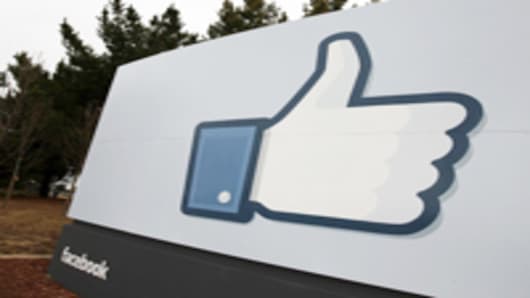Pivotal Research Group's Brian Wieser says Facebook's move is for "largely technical and very circular reasons." He says long-only institutions were waiting for a time with limited downside risk.
Today, with short-sellers pulling back, Wieser says shareholders are positioned to hold off for better prices, giving those long-only institutional investors more confidence the stock will continue to perform.
Facebook's decline by more than 45 percent since the IPO, means it's trading at less than the value where many later investors bought in. It appears those shareholders are confident their investment will pull out of the red.
At the beginning of the year Goldman Sachs' investment in Facebook was at a $50 billion valuation, General Atlantic's invested at a $65 billion valuation. And Fidelity invested $150 million in Facebook in March of 2011 at $25 a share.
Here's the virtuous cycle: a number of investors waited to buy until after this lockup expiration. Now all that money that was waiting on the sidelines, including institutional investors, have fewer fears about downside risk. The fact that the stock is rising, is encouraging those original investors to hold on longer. That in turn puts more pressure on shorts and gives more confidence to investors.
Interest in shorting Facebook has been declining for some time. In the first half of November the number of shares being borrowed—a good measure of short selling, declined by around 40 percent, to its lowest level since June, according to SunGard Financial Systems' Astec Analytics.
This decline followed the lock-up expiration at the end of October when 234 million shares held by current employees became eligible to sell. The fact that Facebook has withheld 120 million shares as part of its plan to cover the 45 percent tax bill, also reduced the number of shares that could hit the market, a net positive.
With momentum after Facebook's most recent earnings report, there's optimism that Facebook's fundamentals support a higher stock price. Most notably, Facebook reported that it's rapidly growing its mobile ad revenue, and it has returned its advertising to accelerating growth.
With the rollout of new ad formats, there could be upside following the next earnings report, which is expected to show Facebook making more money from mobile ads and new revenue from the likes of 'Gifts.'
A number of analysts are praising Facebook for better articulating its plan to grow Internet and mobile advertising—and welcoming CEO Mark Zuckerberg's newfound enthusiasm for generating profits.
Cantor Fitzgerald's Youssef Squali, who has a 'Buy' on the stock calls Facebook a 'long term winner.'
Wieser said Facebook's business is becoming better understood, saying it "had a strong 3Q and showed favorable momentum monetizing mobile ad inventory with progress towards generating revenue from an exchange and an ad network."
And Wedbush's Michael Pachter who recommended at the end of October that investors "consider waiting to accumulate shares" until after the lockup period, rates the stock Outperform, citing strong growth in mobile monetization.
Analysts certainly aren't universally positive: BTIG's Rich Greenfield still has a $16 price target and sell rating on Facebook."There's been a lot of focus on unlock dates," Greenfield says, but he says he's concerned about the stock because of the challenge of mobile.
CNBC's Gary Kaminsky says the fact that Facebook is not owned by a lot of closet indexers, makes the stock an attractive holding going into the end of the year. The fact that just over 30 percent of the shares are institutionally owned is a plus.
-By CNBC's Julia Boorstin
@JBoorstin
Questions? Comments? MediaMoney@cnbc.com



